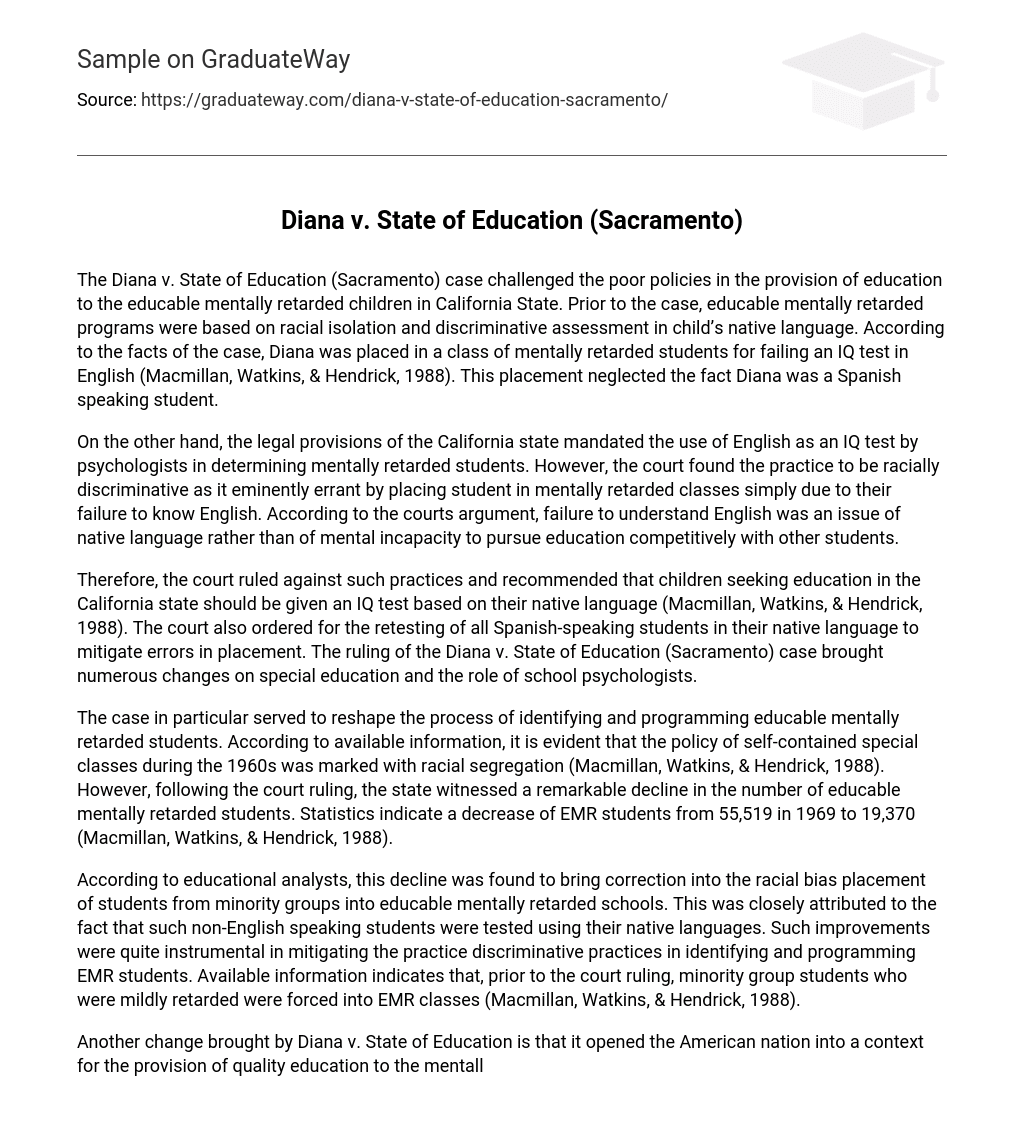The Diana v. State of Education (Sacramento) case challenged the poor policies in the provision of education to the educable mentally retarded children in California State. Prior to the case, educable mentally retarded programs were based on racial isolation and discriminative assessment in child’s native language. According to the facts of the case, Diana was placed in a class of mentally retarded students for failing an IQ test in English (Macmillan, Watkins, & Hendrick, 1988). This placement neglected the fact Diana was a Spanish speaking student.
On the other hand, the legal provisions of the California state mandated the use of English as an IQ test by psychologists in determining mentally retarded students. However, the court found the practice to be racially discriminative as it eminently errant by placing student in mentally retarded classes simply due to their failure to know English. According to the courts argument, failure to understand English was an issue of native language rather than of mental incapacity to pursue education competitively with other students.
Therefore, the court ruled against such practices and recommended that children seeking education in the California state should be given an IQ test based on their native language (Macmillan, Watkins, & Hendrick, 1988). The court also ordered for the retesting of all Spanish-speaking students in their native language to mitigate errors in placement. The ruling of the Diana v. State of Education (Sacramento) case brought numerous changes on special education and the role of school psychologists.
The case in particular served to reshape the process of identifying and programming educable mentally retarded students. According to available information, it is evident that the policy of self-contained special classes during the 1960s was marked with racial segregation (Macmillan, Watkins, & Hendrick, 1988). However, following the court ruling, the state witnessed a remarkable decline in the number of educable mentally retarded students. Statistics indicate a decrease of EMR students from 55,519 in 1969 to 19,370 (Macmillan, Watkins, & Hendrick, 1988).
According to educational analysts, this decline was found to bring correction into the racial bias placement of students from minority groups into educable mentally retarded schools. This was closely attributed to the fact that such non-English speaking students were tested using their native languages. Such improvements were quite instrumental in mitigating the practice discriminative practices in identifying and programming EMR students. Available information indicates that, prior to the court ruling, minority group students who were mildly retarded were forced into EMR classes (Macmillan, Watkins, & Hendrick, 1988).
Another change brought by Diana v. State of Education is that it opened the American nation into a context for the provision of quality education to the mentally retarded students. This is because it abolished the policies of having self contained classes for the students which were eminently marked with high levels of racial segregation (Macmillan, Watkins, & Hendrick, 1988). It is worth noting that the practice of discriminative classes for students meant non-uniform teaching, testing, and grading practices in the nation.
Therefore, the court ruling served to fair and just assessment of students. Lastly, the role of any government is to provide quality education to its members as a crucial tool for enhancing the competitive advantage of such members in the mainstream job economy. On the other hand, school psychologist should serve to promote fair and just placement of students based on their actual IQ. This ruling changed the job of school psychologists by dictating for testing of student based on their native languages.





